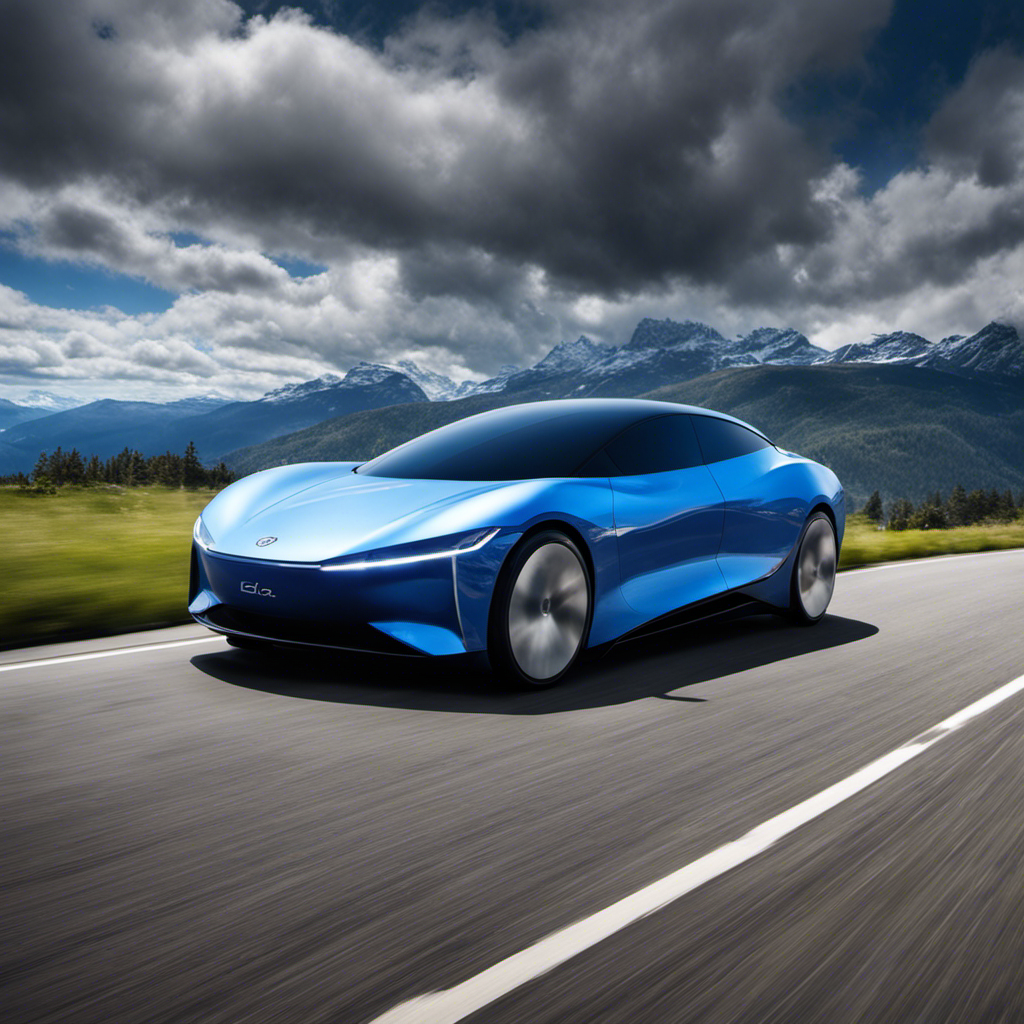Electricity Vehicle
Comparing Electric Vehicles and Petrol Vehicles: Making an Informed Choice for Your Next Car

Electric Vehicle Vs Petrol Vehicle
Hello all! I specialize in electric versus gasoline vehicle technology, and I’m eager to provide you insights into which kind of vehicle better suits your requirements.
It’s a tricky question – electric vehicles have come a long way in recent years, but there are still some advantages that petrol cars can offer. In this article, we’ll be exploring the differences between these two types of cars so you can make an informed decision when it comes time to buy or lease one.
We’ll start by looking at the pros and cons of each option: what kind of range do they have? What about emissions? How much does each cost over its lifespan?

We’ll also go over safety considerations and other factors like convenience and comfort. With all this information in hand, you should be able to find the right EV or petrol car for your lifestyle.
So let’s get started!
Range
When considering electric vehicle vs petrol vehicle, range is an important factor to consider. Electric vehicles offer far greater fuel efficiency than petrol powered cars, with some EVs able to travel around 300 miles on a single charge. This means that EV owners do not have to worry about frequent stops at the gas station and can use their car for long trips without having to plan ahead of time where they will be charging up.
Additionally, this increased fuel efficiency also leads to fewer emissions being released into the environment which helps in reducing our environmental impact.
On the other hand, petrol-powered vehicles still remain popular due to how easy it is to find gasoline stations nearly everywhere you go. They are also usually cheaper upfront compared to electric vehicles and often require less maintenance as well.
However, this convenience does come at a cost – petroleum engines emit more pollutants into the air than electric motors which contributes significantly towards global warming.
As such, when making a decision between an electric vehicle and a petrol-powered one, it’s important to take into account both your current budget and lifestyle along with what kind of environmental impact you want your car choice to have. By doing so, you’ll be able make sure you choose the right car for yourself while helping reduce your ecological footprint too!
Emissions
Electric vehicles have the potential to make a huge impact on our environment when it comes to emissions. From reduced dependency on petrol and diesel, to lower fuel consumption rates, electric cars are significantly less polluting than their traditional counterparts.
With an impressive range of up to 300 miles per charge, they offer a viable alternative for those looking for significant environmental benefits as well as substantial fuel savings.
The reduction in greenhouse gas emissions from electric vehicles is astounding; some studies suggest that this could reach up to 80% compared with conventional engines.
Electric propulsion also delivers improved air quality since there is no longer any need for combustion engines and all the associated toxins released into the atmosphere.

Moreover, what makes them even greener is that the electricity used can be generated by renewable sources such as solar or wind power instead of fossil fuels.
This switch away from gasoline-powered vehicles presents us with an exciting opportunity to reduce our carbon footprint while still enjoying the convenience of motorized transportation.
Achieving meaningful reductions in global emissions will depend heavily on how quickly we transition towards clean energy options like electric vehicles.
Cost
Electric vehicles (EVs) have become increasingly popular over the past few years due to their fuel efficiency and lower operating costs. EV owners can save hundreds of dollars on gas compared to petrol vehicle owners, which makes them an attractive option for consumers looking to reduce their environmental impact while saving money.
The cost savings from owning an electric vehicle are significant. EVs offer a significantly better mileage-per-gallon than gasoline cars, meaning that you won’t need to fill up as often or buy expensive gasoline. Additionally, since they run on electricity rather than fuel, there is no need for regular oil changes or other maintenance services that come with traditional cars.
In short, EVs provide more bang for your buck in terms of miles per gallon and overall cost savings.
Furthermore, many states provide incentives such as tax credits and rebates to encourage people to purchase electric vehicles. This helps make purchasing an EV even more affordable and provides additional financial benefits to those who invest in this technology.
Benefits of Electric Vehicles:
- Lower Operating Costs
- Better Mileage-Per-Gallon
- Financial Incentives Available
In fact, these advantages mean that choosing an electric vehicle often pays off in the long run – making it a smart choice both financially and environmentally conscious decision. With the proper recharging infrastructure in place, EVs could be the way forward towards a cleaner future for everyone.
Recharging Infrastructure
When comparing electric vehicles (EVs) with petrol-powered cars, the cost of fueling is a major factor to consider. Petrol and diesel are comparatively cheap sources of energy for transportation but EV owners have access to cheaper electricity than petrol. EVs that use renewable energy from solar panels or wind turbines can be powered almost entirely without any additional costs. This makes them an even more attractive option in terms of long-term savings on fuel expenses.
Recharging infrastructure is another important element when discussing electric vs petrol vehicle costs. Many cities already possess public charging points, allowing drivers to recharge their batteries while they go about their daily activities. Recharging times vary depending on the type and size of battery used – typically taking between 30 minutes and 8 hours – so it’s worth researching what kind of car fits your lifestyle best before making a purchase decision. Furthermore, some companies offer workplace charging facilities which may reduce recharging times significantly if you’re able to plug in during the day.
The availability of reliable charging infrastructure has been a key barrier to EV adoption in recent years, but that’s now changing rapidly as governments around the world invest heavily into expanding this network across urban areas. The growing presence of charging stations means there are fewer impediments for drivers considering switching from traditional gasoline engines to greener alternatives such as EVs – leading us naturally into our next topic: safety.
Safety
When it comes to safety, electric vehicles are often considered the superior choice. This is primarily due to their lack of exhaust fumes and emissions, which can improve air quality both inside and outside of the vehicle for drivers and passengers alike. Additionally, these zero-emissions cars pose less risk when driving in densely populated areas as they produce no toxins that may harm those nearby.
Electric vehicles have also been seen to provide better driver protection than petrol vehicles in certain scenarios. For example, some studies show that electric vehicles offer a higher level of occupant protection compared to traditional combustion engine cars during side collision tests. Electric cars absorb energy from impact more effectively due to their lightweight frames and battery packs being located beneath the cabin flooring. As such, this reduces passenger injuries significantly by providing an extra layer of cushioning between occupants and any objects within the car’s exterior bodywork.
The advancements made in recent years with regard to safety technology mean that many electric models now come equipped with automated driver assistance systems (ADAS). These features include things like lane departure warnings, blind spot monitoring and automatic emergency braking – all of which help reduce accidents on the road and make travelling safer for everyone involved.
Moving forward, we should expect to see even more sophisticated ADAS technologies added into future models as manufacturers continue striving towards making roads safer places for drivers everywhere. With improved maintenance procedures too, there’s much potential when it comes to ensuring motorists stay safe on their journeys every time they step behind the wheel!
Maintenance
When it comes to the ongoing debate of electric vehicles (EVs) vs petrol vehicles, safety is an important factor. While EVs are generally safer because there’s no risk of gas explosions and they have less moving parts than combustion engines, people often express concern about their battery life or lack of charging infrastructure.
Fortunately, maintenance for EVs is a much simpler process compared to petrol cars. There are fewer mechanical components to worry about such as fuel injectors and spark plugs that can easily get clogged up or break down in traditional vehicles. This means you don’t need to go through costly repairs every few months like you might with a petrol vehicle:
- EV motors tend to be more reliable than combustion engines;
- They require less frequent oil changes due to the absence of pistons;
- And they last longer since they have fewer wear-and-tear components like belts and hoses.
Moreover, EVs offer excellent fuel efficiency while helping reduce pollution levels significantly thanks to zero tailpipe emissions. This makes them ideal for those looking for greater cost savings and a reduced carbon footprint without having to compromise on performance.
Performance
As electric vehicles and petrol vehicles continue to be compared, performance is an important factor that needs to be considered. To better understand their differences in this category it’s worth taking a closer look at the following factors: fuel efficiency, emissions control, acceleration, and overall range.
The first area of comparison is fuel efficiency. Electric cars are significantly more efficient than petrol cars since they do not have complex internal combustion engines; instead drawing energy directly from electricity stored in batteries. In addition, these motors require much less maintenance and can generate higher torque output with less effort on the motor itself. This allows them to achieve greater speeds while using less fuel than traditional petrol-powered vehicles.
When it comes to emissions control, electric cars have zero tailpipe emission which makes them far cleaner for the environment than petrol powered cars. However, depending on where the electricity is sourced from when charging your car there may still be some environmental impact associated with powering your vehicle – but even then it will still likely be lower than that of a conventional gasoline vehicle.
| Fuel Efficiency | Emissions Control | Acceleration | Overall Range | |
|---|---|---|---|---|
| Higher | Zero | Faster | Shorter |
Acceleration
Having discussed the performance of electric vehicles vs petrol vehicles, it’s time to move on to acceleration.
Acceleration is an important factor when considering a vehicle purchase and this will depend largely on what type of engine you choose. Electric cars are powered by either one or two motors that provide instant torque, giving them excellent acceleration compared to petrol cars. This makes them ideal for city driving as they can zip around corners without losing momentum.
In terms of road handling, both types of car offer good stability with minimal body roll due to their suspension systems. However, electric cars tend to have better traction because of their low centre of gravity which helps in cornering and manoeuvring at higher speeds.
Additionally, electric cars benefit from regenerative braking technology which helps slow the car down faster than petrol models do.
The fuel efficiency of electric cars is far greater than that of petrol-powered ones since electricity costs much less per mile than gasoline does. Moreover, most electric vehicles come with advanced battery management systems that help maximize range while also allowing for more efficient use of energy over long distances – something not possible with traditional fossil fuels like diesel or petrol.
Comfort
When it comes to comfort, electric vehicles and petrol vehicles differ considerably.
Electric vehicles provide a much smoother ride and are much quieter than petrol vehicles, making for a more pleasant driving experience.
Additionally, electric vehicles tend to have more interior space than petrol vehicles, so drivers can enjoy a more comfortable ride.
All in all, when it comes to comfort, electric vehicles have a clear advantage over petrol vehicles.
Noise Levels
When it comes to the comfort of electric vehicle vs petrol vehicle, one key factor is noise levels.
Many people are concerned about noise pollution from cars and how that can affect their wellbeing; this is why sound quality plays an important role in determining which type of car is best for them.
Electric vehicles produce very little engine noise when compared to petrol cars; this makes them much more comfortable to ride in since they don’t have all the loud humming sounds coming from a combustion engine.
On top of that, most electric cars come with sound insulation materials installed in order to reduce any outside noises entering the cabin.
This means you can enjoy a much quieter experience while driving your EV than if you were driving a gasoline-powered car.
By choosing an EV over a petrol vehicle, you’ll be able to take advantage of these features and travel in peace without having to worry about annoying fumes or excessive vibrations from your engine.
Smooth Ride
When it comes to comfort, the smooth ride of an electric vehicle is a major factor that can’t be overlooked.
EVs are much quieter than petrol cars and their lack of vibration makes for a smoother driving experience. Plus, they usually come with advanced suspension systems which make them even more comfortable when going over bumps or uneven roads.
On top of that, EVs have much better fuel efficiency compared to petrol cars; this means you’ll save money on gas while helping reduce air pollution at the same time.
All in all, EVs offer not just a smoother ride but also other benefits like improved fuel economy and reduced emissions – making them the clear winner when it comes to overall comfort.
Interior Space
When it comes to interior space, electric vehicles are a definite step up from petrol cars. EVs tend to have a lot more trunk and cabin room than their petrol counterparts due to the lack of bulky engines.
This extra space can be utilized for storage or even seating if you’re looking for more passengers in your car. On top of that, EVs come with advanced tech like digital displays which provide an overall better user experience when compared to analogue dashboards found in older petrol cars.
And speaking of fuel efficiency, EVs offer much higher MPG ratings – this means you’ll save money on gas while also being able to do your part for the environment by reducing emissions.
All these factors make electric vehicles not just comfortable but also eco-friendly and cost effective at the same time!
Convenience
Driving an electric vehicle is like entering a world of convenience that you could never even imagine! The fuel efficiency, driving experience and overall ease of use are simply unparalleled.
Here’s why EV drivers will love the convenience factor:
- No more trips to the gas station – charge it in your own garage or parking spot
- Quieter ride with fewer moving parts and no engine noise
- Improved acceleration as electric cars have instant torque when starting up
- Lower maintenance costs due to a lack of oil changes, spark plug replacements etc.
- Faster regenerative braking than traditional vehicles for quicker stops.
All these advantages make EVs so much easier to drive on a daily basis and create an amazing feeling every time you hit the road!
Plus, with advanced technology such as automated charging systems, it’s now easier than ever to keep your car at optimal levels without having to do any manual work.
So if you’re looking for maximum convenience while behind the wheel – go electric!
Battery Capacity
When it comes to convenience, electric vehicles have the advantage as they require less maintenance and don’t produce any emissions. This makes them a great choice for those looking for an environmentally friendly option when driving.
But another key factor in determining which vehicle is right for you is battery capacity. Electric vehicles are powered by energy stored in batteries, so having a good amount of storage is essential if you want to make sure that your car can take you wherever you need to go without needing frequent charging stops.
Fortunately, most modern EVs come with high-capacity lithium ion batteries that offer plenty of range on one charge – up to 250 miles or more depending on the model. In comparison, petrol cars tend to be limited in terms of fuel economy due to their reliance on gasoline or diesel engine powertrains.
So while both electric and petrol vehicles offer advantages and disadvantages when it comes to convenience and battery capacity, it ultimately boils down to personal preference. If you’re looking for a low-maintenance car with excellent range capabilities then an EV could be just what you need; however if long trips across large distances are more your thing then petrol may still be the way forward.
Resale value will also play an important role in making this decision – let’s delve into that now!
Resale Value
When it comes to resale value, electric vehicles are becoming more and more attractive to buyers. The fuel economy of EVs is much better than the traditional petrol cars, which makes them less expensive to run over time. On top of that, insurance premiums for EVs tend to be much lower as well – making them an even more appealing option.
Here’s a list of why electric vehicles offer such great resale values:
- Low fuel costs
- Lower insurance premiums
- Reduced vehicle maintenance expenses
This combination of factors means that electric vehicles have become extremely desirable in the secondhand car market today. It’s no wonder they’re being snapped up quickly by savvy buyers looking for a good deal! With all this in mind, prospective EV owners can look forward to potentially higher returns on their investment when selling their vehicle later down the line.
Now let’s take a closer look at noise levels associated with these two types of cars…
Noise Levels
When it comes to noise levels, electric vehicles are significantly quieter than petrol vehicles. This can be attributed to the fact that electric engines produce much less noise when compared with internal combustion engine powered cars.
As a result of this difference in engine type, EV owners are able to enjoy an experience of near-silence while driving their vehicle unlike drivers of petrol cars who must put up with the humming and revving noises associated with gasoline-powered automobiles.
In addition to being much quieter than petrol vehicles, electric cars also offer superior fuel economy due to the greater efficiency of electric motors. EVs have been shown to achieve up to four times higher mileage per gallon as opposed to traditional gasoline or diesel motorcars. Furthermore, EV drivers don’t need to worry about frequent visits for refueling – all they need is access to an electrical outlet or charging station which is becoming increasingly available given recent advances in technology and government support for green initiatives.
Moreover, parking availability tends to be more convenient for those who own an EV since these types of cars require less space than conventional gas guzzlers. Electric car owners benefit from smaller parking garages and more accessible spaces since they do not take up nearly as much room as petrol-powered vehicles do.
With this increased convenience factor along with fewer environmental pollutants released into the atmosphere, it’s no surprise why so many people are choosing electric over petrol-driven cars today! Moving on from here, let’s explore how design choices affect each type of vehicle…
Design
When it comes to body design, electric vehicles have a much sleeker look than petrol vehicles due to their lack of exhaust pipes and other bulky engine parts.
For interior design, electric vehicles tend to feature simpler, modern layouts and more digital displays, while petrol vehicles often have a more traditional look.
Ultimately, it comes down to personal preference when it comes to the design of electric vs. petrol vehicles.
I’m a big fan of the modern look of electric vehicles, but I understand that some people may prefer the classic look of a petrol vehicle.
Body Design
When it comes to body design, electric vehicles and petrol vehicles have some very distinct differences. I’m an expert in the field of EVs and petrol cars so let me break down the key elements for you.
When it comes to aerodynamics, petrol vehicles tend to be more streamlined than EV’s due to their need for greater efficiency when using gasoline. On the other hand, EV’s are generally designed with a boxier look as they don’t require as much air flow around them.
Another big difference between both designs is weight distribution; gas powered vehicles tend to be heavier on the front end while most electrical models are rear wheel drive which allows for better handling and maneuverability.
All in all, understanding how these two types of vehicles differ in design can help drivers make informed decisions about what type of car best suits their needs.
Interior Design
Now let’s move on to interior design.
When comparing electric vehicles and petrol cars, we can see a couple of key differences that make them suited for different types of drivers.
For instance, EV’s are typically designed with fuel efficiency in mind; they feature lightweight materials such as plastic and aluminum which help reduce emissions control costs over time.
On the other hand, petrol-powered models will usually have more luxurious interiors made from higher quality materials like leather or wood meant to give off an air of luxury.
Additionally, many EVs come equipped with advanced tech features like touchscreens, GPS navigation systems and internet connectivity – something you won’t find in traditional gasoline models.
Ultimately, if functionality is your priority then an EV might be the right choice for you but if styling matters most then petrol may be the way to go!
Environmental Impact
Going from the design of electric and petrol vehicles to their environmental impacts, it’s clear that these two types of cars have significantly different effects on our planet.
With energy efficiency being a major priority in today’s world, electric vehicles win out in this area compared to petrol vehicles. Electric vehicles are powered purely by electricity which is generated from renewable sources such as solar or wind, making them incredibly efficient when it comes to using power.
On the other hand, petrol-powered vehicles rely on gasoline for fuel and produce more carbon dioxide emissions than electric vehicles do. When it comes to air quality, electric vehicles also come out ahead due to their lack of tailpipe emissions. This means that no harmful gas is released into the environment while driving an electric vehicle – something which can’t be said about petrol-powered cars.
In addition, electric cars also tend to be quieter than petrol ones because they don’t need engines with loud exhausts. Therefore, not only can they reduce pollution levels but they can also make neighbourhoods much calmer places to live.
Electric and petrol cars both have distinct advantages and disadvantages when it comes to their environmental impact, but overall there’s no denying that EVs offer many benefits over traditional combustion engine automobiles. They provide more energy efficiency and fewer emissions which makes them better for the planet in the long run – something we should all strive towards preserving for future generations.
Frequently Asked Questions
How Long Does It Take To Charge An Electric Vehicle?
When it comes to charging electric vehicles, there’s no one-size-fits-all answer. It all depends on the battery capacity and charging speed of your car – both of which vary significantly between models.
On average, however, most EVs will take around four hours to charge from empty to full at home using a standard 7kW wall charger.
This is much faster than refilling a petrol or diesel tank, making electric cars an attractive option for those wanting convenience as well as environmental benefits.
What Is The Expected Lifespan Of An Electric Vehicle Battery?
When it comes to electric vehicles, a common concern is the expected lifespan of their batteries. On average, you can expect your battery to last between 8 and 12 years depending on its charging speed and capacity.
This range applies for all types of electric vehicle models whether they are hybrids or fully-electric cars. With regular maintenance and proper charging techniques, many drivers have reported that their batteries lasted even longer than expected!
Ultimately though, the answer depends on how often you use your car and how well you maintain it.
How Much Does It Cost To Insure An Electric Vehicle?
Insuring an electric vehicle can be a cost-effective way to go green.
It’s estimated that insuring an EV costs around 20% less than insuring a petrol car, due in part to their lower environmental impact and fewer repair needs.
When considering the cost comparison of EVs vs petrol vehicles, we must factor in insurance rates as well – with significant savings for those who choose an electric ride!
What Are The Differences In Driving Experience Between An Electric Vehicle And A Petrol Vehicle?
When it comes to driving experience, electric vehicles and petrol vehicles differ greatly.
Electric cars offer a much smoother ride than their petrol counterparts thanks to the lack of engine noise and vibration associated with an internal combustion engine.
Drivers will also benefit from higher torque levels in an electric vehicle for improved acceleration, as well as regenerative breaking that can help recharge the battery when slowing down or coming to a stop.
In terms of environmental impact, electric cars are superior since they don’t produce emissions while running on electricity instead of gasoline; this makes them more fuel efficient too!
Ultimately, both options provide unique advantages but if you’re looking for a greener driving experience then an electric car is definitely worth considering.
Does An Electric Vehicle Require More Frequent Servicing Than A Petrol Vehicle?
When it comes to servicing, there’s a big difference between electric vehicles and petrol vehicles.
Generally speaking, an EV requires less frequent servicing than its petrol counterpart, meaning fewer trips to the garage which saves you time and money.
That said, EVs do require more maintenance when it comes to environmental costs; for example, making sure your battery is properly charged can reduce fuel savings over time.
Ultimately, both types of cars need regular check-ups and tune ups – but with EVs you get the added benefit of saving more time and energy in the long run.
Conclusion
Electric vehicles are quickly becoming the preferred choice of vehicle for many drivers due to their environmental and cost benefits.
With charging times that rival petrol refuelling, an expected battery lifespan of up to ten years, lower insurance costs and a smooth driving experience, electric vehicles have plenty of advantages over traditional gasoline-powered cars.
The only downside may be higher servicing costs as electric components require more frequent attention than those in a petrol car.
All things considered, it’s clear why so many people are making the switch from petroleum powered vehicles to electric ones!
Electricity Vehicle
The Advantages of Biofuels: Renewable, Carbon Neutral, Local Production

Exploring the realm of biofuels has left me fascinated with their remarkable benefits. These fuels are sustainable, produce no net carbon emissions, and can be manufactured locally within our communities.
Made from crops and other renewable materials, biofuels are considered carbon-neutral and have the potential to replace fossil fuels in vehicles. With organizations aiming for a 25% increase in biofuel usage by 2050 and New Zealand implementing a biofuels mandate by 2021, the potential for a greener future is within our grasp.
But amidst the debate on their carbon-neutrality, let’s explore the undeniable benefits of biofuels.
Key Takeaways
- Biofuels are renewable energy sources that can help reduce greenhouse gas emissions and combat climate change.
- They are carbon neutral and can partially replace fossil fuels in vehicles.
- Biofuels can be produced locally, reducing dependence on foreign energy sources and creating jobs in rural areas.
- Investing in biofuel production can stimulate economic growth and save currency for development projects.
Environmental Sustainability
I believe that biofuels play a crucial role in environmental sustainability. They are renewable, carbon neutral, and can be produced locally.
Biofuels are derived from renewable resources, such as crops, which can be grown and harvested repeatedly. Unlike fossil fuels, which are finite and contribute to climate change, biofuels do not release additional carbon dioxide into the atmosphere when burned. They offer a viable alternative for reducing greenhouse gas emissions and mitigating climate change.
Additionally, biofuels can be produced locally, reducing dependence on foreign energy sources and promoting local economic development. By investing in biofuel production, we can harness the power of renewable resources and make significant strides towards a more sustainable future.
Reduced Carbon Footprint
Using biofuels significantly reduces the amount of carbon emissions released into the atmosphere. This is important in the fight against climate change and the mitigation of its effects. Biofuels offer several advantages in terms of carbon offset and climate change mitigation:
-
Renewable energy source: Biofuels are made from renewable materials, such as crops, making them a sustainable alternative to fossil fuels.
-
Carbon neutral: Biofuels are considered carbon neutral because the carbon dioxide released during their combustion is balanced by the carbon dioxide absorbed during the growth of the feedstock.
-
Can be produced locally: Biofuels can be produced locally, reducing dependence on foreign energy sources and promoting self-sufficiency.
-
Can be used to produce heat: Biofuels can be used to produce heat, providing a clean and efficient energy source for various applications.
-
Not a substitute for fossil fuels, but a valuable source of energy: While biofuels cannot fully replace fossil fuels, they play a crucial role in diversifying the energy mix and reducing greenhouse gas emissions.
Energy Independence
Investing in renewable energy sources like biofuels promotes energy independence and reduces reliance on foreign energy. This is crucial for reducing imports and ensuring national security.
Biofuels offer numerous advantages that contribute to these goals. First, they are a renewable energy source, meaning they can be continually produced without depleting finite resources. Additionally, biofuels are carbon neutral, as they are made from renewable materials such as crops. This helps reduce greenhouse gas emissions and combat climate change.
Furthermore, biofuels can be produced locally, reducing dependence on foreign energy sources. This not only enhances energy security but also stimulates the economy by creating jobs in rural areas.
Economic Benefits
Stimulating the economy and creating job opportunities, the production of biofuels offers significant economic benefits.
-
Cost effectiveness: Biofuels are cheaper than fossil fuels, saving currency for development projects.
-
Rural development: Biofuel production creates jobs in rural areas, boosting the country’s economy.
-
Renewable energy source: Biofuels are a sustainable and clean source of power, reducing greenhouse gas emissions.
-
Local production: Biofuels can be produced locally, reducing dependence on foreign energy sources.
-
Environmental benefits: Biofuels are environmentally safe and reduce air pollution.
According to data, biofuels account for approximately 9% of global energy consumption and can often replace fossil fuels. As technology and population growth increase the demand for energy, scientists are increasingly interested in renewable energy sources. Investing in biofuel production not only helps combat climate change but also contributes to rural development and a more sustainable future.
Job Creation in Local Communities
I am particularly interested in the job creation opportunities that biofuel production can bring to local communities. Biofuels, as a renewable and locally produced source of energy, have the potential to stimulate rural development and foster community engagement. Not only do they provide a sustainable alternative to fossil fuels, but they also offer economic benefits by creating employment opportunities in rural areas. By investing in biofuel production, countries can reduce their dependence on foreign energy sources, save currency for development projects, and promote environmental sustainability. Additionally, the production and distribution of biofuels require a skilled workforce, which can lead to the creation of new jobs and the growth of local economies. This presents a significant opportunity for community engagement and rural development.
| Advantages of Biofuels | ||
|---|---|---|
| Renewable Energy Source | Carbon Neutral | Local Production |
| Can be produced locally | Can be used to produce heat | Not a substitute for fossil fuels, but a valuable source of energy |
| Biofuels are carbon neutral | Made from renewable materials such as crops | Can partially replace fossil fuels in vehicles |
| Some organizations aim to increase biofuel usage to 25% by 2050 | New Zealand committed to implementing a biofuels mandate by 2021 | Debate on whether biofuels are truly carbon neutral |
| Biofuels account for approximately 9% of global energy consumption | Can often replace fossil fuels | Growing demand for energy due to technology and population growth |
Potential for Future Expansion
In my previous discussion on job creation in local communities, I highlighted the positive impact of biofuel production on rural areas. Now, let’s explore the potential for future expansion in this industry.
With the growing demand for renewable energy sources, biofuels have a significant potential market. Technological advancements play a crucial role in unlocking this potential. Here are some key points to consider:
- Advanced biofuel production techniques are being developed, increasing efficiency and reducing costs.
- The integration of biofuels into existing infrastructure, such as transportation and heating systems, is becoming more feasible.
- Research and development efforts are focused on creating new biofuel feedstocks, expanding the range of available resources.
- Government policies and incentives are driving investment in biofuel technologies, creating a supportive environment for growth.
- Collaboration between industries and academia is fostering innovation, leading to breakthroughs in biofuel production.
These factors indicate a promising future for biofuels, making them a compelling option for sustainable energy solutions.
Frequently Asked Questions
What Are Some of the Main Environmental Concerns Associated With Biofuel Production?
When it comes to biofuel production, there are a few environmental concerns to consider.
One of them is the water usage involved in growing the crops used to make biofuels.
Another concern is the land use required for biofuel production, which can potentially lead to deforestation or the displacement of food crops.
It’s important to carefully manage these aspects in order to ensure the sustainability and environmental benefits of biofuels.
How Does the Carbon Footprint of Biofuels Compare to That of Fossil Fuels?
When comparing the carbon footprints of biofuels and fossil fuels, it is important to consider the environmental concerns in biofuel production.
Biofuels are often touted as carbon neutral because they are made from renewable materials. However, there is ongoing debate about whether they truly offset carbon emissions.
Fossil fuels, on the other hand, are known to be major contributors to greenhouse gas emissions.
It is crucial to thoroughly examine the life cycle of both types of fuels to make an accurate comparison.
What Are the Potential Drawbacks or Challenges of Achieving Energy Independence Through Biofuel Production?
Achieving energy independence through biofuel production can present some challenges and drawbacks.
One potential drawback is the competition for land and resources between biofuel crops and food crops, which can lead to higher food prices and food insecurity.
Additionally, the production process of biofuels requires significant amounts of water and energy, which can have environmental impacts.
There may also be logistical challenges in establishing a robust biofuel production infrastructure and distribution network.
Overall, while biofuels offer advantages, careful consideration of these challenges is necessary.
How Do the Economic Benefits of Biofuel Production Compare to Those of Fossil Fuel Production?
When comparing the economic advantages of biofuel production to those of fossil fuel production, it’s important to consider factors such as cost, job creation, and environmental impact.
Biofuels have the potential to be produced locally, reducing dependence on foreign energy sources and stimulating the economy through job creation. Additionally, biofuels are renewable and can help reduce greenhouse gas emissions.
However, the cost of biofuel production may still be higher compared to fossil fuels, and there may be challenges in scaling up production to meet demand.
What Factors Could Limit the Potential for Future Expansion of Biofuel Production?
Factors that could limit the potential for future expansion of biofuel production include: limited availability of feedstock materials, such as crops or waste products; competition for land, water, and resources with other agricultural or industrial activities; potential environmental impacts, such as deforestation or increased water usage; technological and infrastructure limitations for processing and distribution; and economic considerations, such as fluctuating prices of fossil fuels and government policies.
These factors need to be carefully addressed and managed to ensure the sustainable growth of biofuel production.
Conclusion
In conclusion, biofuels offer numerous advantages that make them a promising source of energy. They are renewable, carbon-neutral, and can be produced locally, reducing our dependence on foreign energy sources.
Not only do biofuels help reduce greenhouse gas emissions and combat climate change, but they also have the potential to create jobs and stimulate economic growth in local communities.
With their environmental sustainability, reduced carbon footprint, energy independence, economic benefits, and potential for future expansion, biofuels present a compelling solution for a more sustainable and clean energy future.
Electricity Vehicle
The Advantages of Electric Vehicles: Efficiency, Performance, and Sustainability

I must emphasize, opting for electric vehicles (EVs) is the smart move! Were you aware that the operational expenses of EVs are notably lower than those of conventional gasoline or diesel vehicles? Indeed, it’s a fact! Thanks to lower fuel costs, reduced emissions taxes, and diminished maintenance expenditures, owning an EV could lead to substantial financial savings for you.
Not only that, but EVs also offer remarkable performance, smooth acceleration, and instant torque. And let’s not forget about the environmental benefits – reduced emissions, improved air quality, and conservation of resources.
Trust me, choosing an EV is a win-win situation!
Key Takeaways
- Electric vehicles have significantly cheaper running costs compared to traditional petrol or diesel cars, saving owners money on fuel economy over time.
- Most governments offer incentives for EV purchases, reducing the overall price and making them more affordable.
- Electric vehicles have reduced greenhouse gas emissions and contribute less to global warming, improving air quality and reducing health problems.
- Electric vehicles provide remarkable road handling, smooth acceleration power, and feature regenerative braking systems that increase battery life and provide more control.
Cost Efficiency and Incentives
I can save money on fuel economy and take advantage of government incentives by choosing an electric vehicle.
Electric vehicles (EVs) offer significant financial benefits and are becoming more affordable. EVs have significantly cheaper running costs compared to traditional petrol or diesel cars. With no emissions taxes and fewer maintenance costs, EV owners can save money over time.
Additionally, most governments offer incentives for EV purchases, reducing the overall price of the vehicle. Charging infrastructure is also becoming more widespread and accessible, reducing installation and energy costs.
Performance and Range
Regenerative braking systems in electric vehicles contribute to longer battery life and provide greater control over acceleration. This innovative technology harnesses the energy produced during braking, converting it into usable electricity to recharge the battery.
With advancements in battery technology, electric vehicles are now capable of achieving impressive performance and range. However, range anxiety, the fear of running out of battery power, still lingers in the minds of some potential electric vehicle owners.
Fortunately, continuous advancements in battery technology are helping to alleviate this concern. Longer-lasting batteries and improved charging infrastructure are extending the range of electric vehicles, making them a viable option for long-distance travel.
With these advancements, range anxiety is becoming less of a barrier, allowing more people to embrace the benefits of electric vehicles.
Environmental Impact and Resource Conservation
Reduced greenhouse gas emissions and improved air quality are key benefits of electric vehicles. They run on electricity instead of fossil fuels, emitting significantly fewer pollutants. This leads to improved air quality and reduced health problems. The reduction in pollution has a positive impact on the environment and helps combat climate change.
In addition, electric vehicles contribute less to global warming compared to conventional vehicles. They do not release carbon dioxide and other greenhouse gases into the atmosphere. By using electricity instead of petroleum-based fuels, electric vehicles also conserve valuable resources.
Overall, the environmental impact of electric vehicles is much lower than that of traditional vehicles. This makes them a sustainable and eco-friendly transportation option.
Maintenance Requirements and Safety
Regular maintenance is essential for keeping electric vehicles in optimal condition and ensuring safety on the road. Taking care of the battery and other critical components is crucial for preventing unexpected breakdowns and maximizing the lifespan of the vehicle. Here are some key points to consider:
-
Battery maintenance: Regularly checking the voltage levels and wiring connections is important for the overall performance of the electric vehicle. This helps prevent any potential issues with the battery and ensures it functions properly.
-
Safety features: Electric vehicles come with unique safety features, such as larger and heavier batteries, which can affect the vehicle’s stability. Additionally, regenerative braking systems in some models may result in longer stopping distances. It’s important to thoroughly research the chosen electric vehicle model to understand its safety features and ensure maximum safety on the road.
-
Scheduled maintenance: Having a checklist for scheduled maintenance is crucial to ensure optimal performance and safety. Regular oil changes are necessary to prevent dirt build-up and costly repairs.
-
Thorough inspections: Conducting thorough inspections of the electric vehicle’s components, including the battery, wiring, and other critical systems, helps identify any potential issues early on and prevent them from escalating into major problems.
Charging Options and Long-Distance Travel
When it comes to charging options and long-distance travel, I have found that home charging systems provide the most convenient and accessible solution for daily use.
However, when planning for long trips, it is important to consider the EV charging infrastructure along the route. While home charging systems are great for regular use, they may not be sufficient for longer journeys. In these cases, it is necessary to rely on plug-in charging stations or public charging points.
It is worth noting that some public charging points may have high use fees and mobile charging solutions may have inconvenient locations. Therefore, it is crucial to plan ahead and identify the availability of charging stations along the route.
With careful planning, electric vehicles can provide cost savings for frequent road trips, as recharging times are generally faster compared to refueling with gasoline. Additionally, public places often offer free charging spots, making it convenient to top up while on the go.
Cheaper Running Costs
Compared to traditional petrol or diesel cars, I find that running an electric vehicle results in significantly cheaper costs.
Here are some reasons why:
- Electric vehicles have lower fuel costs, as electricity is generally cheaper than gasoline or diesel.
- EV owners can take advantage of government incentives and tax credits, reducing the overall purchase price.
- Maintenance costs are typically lower for electric vehicles, as they have fewer moving parts and don’t require oil changes.
- Electric vehicles also have lower emissions, reducing environmental impact and potential health risks.
When considering a cost comparison between EVs and internal combustion engines, it’s clear that electric vehicles offer substantial savings. Not only are they more efficient and cost-effective to run, but they also contribute to a cleaner and more sustainable future.
Savings on Fuel Economy
Moving on from the previous subtopic of cheaper running costs, let’s now discuss the savings on fuel economy when it comes to electric vehicles.
As an EV owner, I have experienced firsthand the long-term savings that come with driving an electric car. Unlike traditional petrol or diesel cars, electric vehicles have significantly cheaper running costs. This is because they run on electricity, which is generally cheaper than fossil fuels.
Over time, these savings on electricity can really add up, resulting in substantial long-term savings. Additionally, many governments offer incentives for the purchase of electric vehicles, further reducing the overall cost.
No Emissions Taxes
As an EV owner, I’ve been able to save money on emissions taxes due to the environmentally friendly nature of electric vehicles. The government provides incentives, such as emissions tax exemptions, to encourage the adoption of EVs.
Here are some environmental benefits of electric vehicles:
- Reduced greenhouse gas emissions: EVs produce fewer emissions compared to conventional vehicles, contributing to lower levels of global warming.
- Improved air quality: Electric vehicles emit significantly fewer pollutants, which helps to reduce air pollution and improve public health.
- Conservation of resources: By using electricity instead of petroleum-based fuels, EVs help conserve valuable natural resources.
- Fuel economy benefits: Electric vehicles require no refueling stops, which saves time and reduces the consumption of fossil fuels.
Switching to electric vehicles not only saves money on emissions taxes but also contributes to a cleaner and healthier environment.
Government Incentives
When it comes to government incentives, I’ve found that there are various programs and subsidies available to encourage the purchase and use of electric vehicles. These incentives can provide significant financial benefits for individuals looking to make the switch to an electric vehicle.
Governments often offer tax credits or rebates that can reduce the overall purchase price of an electric vehicle. Some regions even provide additional benefits such as free parking or access to HOV lanes. These incentives not only make electric vehicles more affordable but also help to offset the higher upfront costs compared to traditional gasoline-powered cars.
Remarkable Road Handling
I have personally experienced the remarkable road handling of electric vehicles, and it truly enhances the driving experience.
The improved handling and road performance of electric vehicles can be attributed to several factors:
-
Lower center of gravity: Electric vehicles have their heavy batteries located low in the chassis, resulting in a lower center of gravity. This helps improve stability and reduces body roll during cornering.
-
Instant torque: Electric motors deliver instant torque, providing immediate acceleration and better responsiveness compared to traditional internal combustion engines.
-
Regenerative braking: Electric vehicles feature regenerative braking systems that convert kinetic energy into electrical energy, allowing for better control and increased battery life.
-
Weight distribution: The placement of the batteries in electric vehicles helps achieve a more balanced weight distribution, resulting in improved traction and handling.
These features combine to create a driving experience that feels more connected to the road, with improved handling and agility.
Instantaneous Torque Output
Experiencing the instantaneous torque output of electric vehicles is exhilarating and adds to the overall thrill of driving. Electric vehicles (EVs) provide instant acceleration power, thanks to their electric motors that deliver maximum torque from the moment you step on the pedal.
This immediate surge of power allows for quick and seamless acceleration, making EVs feel incredibly responsive on the road.
Additionally, EVs feature regenerative braking systems, which not only enhance control but also provide numerous benefits. When you apply the brakes in an EV, the electric motor acts as a generator, converting kinetic energy back into electrical energy and storing it in the battery.
This process helps to extend the battery life and increase overall efficiency. So, not only do electric vehicles offer instant acceleration power, but they also provide the added advantage of regenerative braking benefits.
Regenerative Braking Systems
The regenerative braking systems in electric vehicles offer several benefits.
Firstly, they increase battery life and improve overall efficiency. This technology allows the vehicle to capture and store the energy that is usually lost during braking. By converting kinetic energy into electrical energy, regenerative braking reduces the strain on the battery, leading to longer battery life and increased longevity of the electric vehicle.
Secondly, regenerative braking enhances energy efficiency. The captured energy is then stored in the battery and can be used to power the vehicle, reducing the reliance on the electric grid and improving the overall energy efficiency of the vehicle.
Additionally, regenerative braking provides an enhanced driving experience. It offers a smoother and more controlled deceleration, improving driver comfort and confidence on the road.
Lastly, regenerative braking has a positive environmental impact. By reducing the energy wasted during braking, it helps to minimize the carbon footprint of electric vehicles, contributing to a cleaner and more sustainable transportation system.
Reduced Greenhouse Gas Emissions
Reduced greenhouse gas emissions in electric vehicles contribute to a cleaner and more sustainable environment. Electric vehicles produce zero tailpipe emissions, which helps to improve air quality and reduce the negative health impacts associated with air pollution.
The transition to electric vehicles also aligns with efforts to combat climate change and reduce carbon emissions. To support the widespread adoption of electric vehicles, there is a need for robust electric vehicle infrastructure, including an extensive charging network.
Investing in this infrastructure will not only encourage more people to switch to electric vehicles but also enable long-distance travel and alleviate range anxiety.
Frequently Asked Questions
Are There Any Disadvantages or Drawbacks to Owning an Electric Vehicle?
There are some disadvantages to owning an electric vehicle. One of the main concerns is the initial cost, as EVs tend to have a higher price tag compared to traditional cars.
Additionally, the limited range of EVs can be a drawback for longer trips, requiring careful planning. Charging times can also vary depending on the battery size and charger type.
However, despite these drawbacks, the cost efficiency and environmental benefits of owning an electric vehicle make it a compelling option for many.
How Long Does It Typically Take to Charge an Electric Vehicle?
Charging an electric vehicle typically takes a few hours, depending on the battery size and charger type.
However, it’s important to note that the charging infrastructure is rapidly expanding, making it easier and faster to charge EVs.
With the increasing availability of charging stations and advancements in technology, the charging time for electric vehicles is continually improving.
This means that as the charging infrastructure continues to grow, the time it takes to charge an electric vehicle will decrease, making EV ownership even more convenient and accessible.
What Is the Average Lifespan of an Electric Vehicle Battery?
The average lifespan of an electric vehicle battery depends on several factors, including usage patterns and environmental conditions. Generally, EV batteries can last anywhere from 8 to 15 years before experiencing significant degradation.
However, it’s important to note that battery technology is constantly improving, and newer EV models may have longer-lasting batteries. Regular maintenance and proper charging habits can also help extend the lifespan of an electric vehicle battery.
How Does the Cost of Electricity for Charging an Electric Vehicle Compare to the Cost of Gasoline for Traditional Cars?
Charging an electric vehicle is significantly cheaper than fueling a traditional car with gasoline. The cost of electricity is lower, and with the widespread electric vehicle charging infrastructure and government incentives, it becomes even more cost-efficient.
Electric vehicles offer long-term savings on fuel economy, with no emissions taxes and fewer maintenance costs.
Are There Any Limitations or Challenges When It Comes to Long-Distance Travel in an Electric Vehicle?
When it comes to long-distance travel in an electric vehicle, there are some limitations and challenges to consider.
One of the main concerns is range anxiety, which is the fear of running out of battery power before reaching a charging station. However, with the growing charging infrastructure, this concern is being addressed.
Planning trips carefully and making use of available charging stations along the route can help alleviate this issue. Additionally, recharging times for electric vehicles are faster compared to refueling with gasoline, making it more convenient for long journeys.
Conclusion
In conclusion, electric vehicles (EVs) offer a multitude of advantages in terms of cost efficiency, performance, and sustainability.
With cheaper running costs, government incentives, and remarkable road handling, EVs are a cost-effective and enjoyable mode of transportation.
They also contribute to a cleaner environment by reducing greenhouse gas emissions and improving air quality.
While there are drawbacks such as limited range and longer charging times, careful trip planning can mitigate these challenges.
Overall, EVs are a smart and sustainable choice for individuals looking to reduce their carbon footprint and enjoy a smooth and efficient driving experience.
As they say, "The proof is in the pudding."
Electricity Vehicle
Hydrogen Fuel Cells: A Green Solution for Cars

As I explore the realm of eco-friendly transport, I am fascinated by the prospects of hydrogen fuel cells. These remarkable gadgets provide a sustainable alternative for vehicles, featuring outstanding energy efficiency and benefits for the environment.
With an efficiency rate of 65%, they can save up to 50% of fuel used in conventional power plants. The best part? They emit no greenhouse gases, improving air quality and reducing pollution.
Despite challenges like high operating costs and limited infrastructure, efforts are underway to expand the hydrogen market and increase the range of fuel cell electric vehicles. By harnessing renewable energy sources, we can further minimize their environmental impact.
Key Takeaways
- Hydrogen fuel cells have high energy density and generate electricity at 65% efficiency.
- Hydrogen fuel cells do not emit greenhouse gas emissions, improving air quality and reducing pollution.
- The high cost of operating hydrogen fuel cells in cars is a major challenge, but production costs are expected to decrease and the price of hydrogen fuel is expected to become much cheaper in the future.
- Hydrogen fuel cells in cars produce 65% more energy per pound than traditional power plants and do not emit any harmful emissions, only water and warm air.
The Energy Efficiency of Hydrogen Fuel Cells
I’m impressed by the high energy density and 65% efficiency of hydrogen fuel cells. They can save 50% of fuel used in conventional power plants. These fuel cells have the potential to revolutionize not only the automotive industry but also stationary applications and aviation.
In stationary applications, hydrogen fuel cells can provide a highly efficient and reliable source of electricity. They can be used to power buildings, data centers, and other facilities, reducing both fuel consumption and greenhouse gas emissions.
As for aviation, hydrogen fuel cells offer an exciting possibility for cleaner and more sustainable air travel. They can power aircraft with zero emissions, reducing pollution and improving air quality.
Although there are still challenges to overcome, such as the need for infrastructure and cost reduction, the potential of hydrogen fuel cells in stationary applications and aviation is promising.
Environmental Benefits of Hydrogen Fuel Cells
Generating electricity at 65% efficiency, hydrogen fuel cells significantly reduce greenhouse gas emissions and air pollution, improving overall environmental quality.
The advancements in hydrogen fuel cell technology have made them a promising solution for a cleaner and greener future.
While currently used primarily in cars, hydrogen fuel cells have the potential for future applications in various industries. Their high energy density and ability to generate electricity without emitting harmful pollutants make them a viable option for powering not only vehicles but also buildings and even factories.
As technology continues to improve, hydrogen fuel cells could play a crucial role in reducing our dependence on fossil fuels and mitigating the effects of climate change.
The future of hydrogen fuel cells holds immense potential in creating a more sustainable and environmentally friendly world.
Cost and Affordability of Hydrogen Fuel Cells in Cars
Operating hydrogen fuel cells in vehicles can be expensive, but efforts are being made to decrease costs and make them more affordable in the future. Here are some key points to consider:
-
Cost effectiveness of hydrogen fuel cell technology:
-
The high cost of operating hydrogen fuel cells in cars is a major challenge.
-
Current fuel cell cars are twice as expensive as comparable hybrid and electric cars.
-
Fuel cell production costs have decreased by 60% in the last decade and are expected to become cost-competitive by 2030.
-
The price of hydrogen fuel in cars is expected to become much cheaper in the future.
-
Government incentives for hydrogen fuel cell adoption:
-
Governments are providing incentives to accelerate the adoption of hydrogen fuel cells.
-
These incentives include tax credits, grants, and subsidies.
-
Governments are also investing in research and development to drive down costs and improve efficiency.
-
These initiatives aim to make hydrogen fuel cell technology more accessible and attractive to consumers.
The Challenges of Operating Hydrogen Fuel Cells in Cars
Driving a hydrogen fuel cell vehicle presents certain challenges that need to be addressed. One of the main challenges is the availability of fueling infrastructure. Currently, there are a limited number of hydrogen filling stations, making it difficult for drivers to find a place to refuel their vehicles. Technological advancements are being made to expand the hydrogen market and increase the range of fuel cell electric vehicles. However, the future prospects for widespread adoption still depend on the development of a robust fueling infrastructure.
To illustrate the challenges in fueling infrastructure, here is a table highlighting the number of hydrogen filling stations in different countries:
| Country | Number of Hydrogen Filling Stations |
|---|---|
| Japan | 132 |
| United States | 44 |
| Germany | 44 |
| South Korea | 31 |
As can be seen from the table, while some countries have made significant progress in establishing hydrogen filling stations, there is still a long way to go to meet the demand. However, with continued technological advancements and investment in infrastructure, the future prospects for hydrogen fuel cell vehicles look promising.
The Decreasing Production Costs of Hydrogen Fuel Cells
Investing in technological advancements has greatly contributed to the decreasing production costs of hydrogen fuel cell technology. This has resulted in several benefits and has the potential to accelerate the adoption of hydrogen fuel cells in various applications.
Some key factors driving the decreasing adoption and cost-effectiveness of hydrogen fuel cells include:
-
Improved Manufacturing Processes:
-
Advanced manufacturing techniques have streamlined the production of fuel cells, reducing costs and increasing efficiency.
-
Automation and robotics have improved the precision and speed of manufacturing, further lowering production costs.
-
Material Innovations:
-
Research and development in materials science have led to the discovery of new materials that are more cost-effective and durable.
-
Novel catalyst materials have been developed, reducing the reliance on expensive and rare metals like platinum.
These technological advancements have made hydrogen fuel cell technology more accessible and affordable, paving the way for its widespread adoption in the future.
The Future Price of Hydrogen Fuel in Cars
As a consumer, I am curious to know how the future price of hydrogen fuel will compare to other alternative energy options.
The potential challenges of hydrogen fuel cell adoption in the automotive industry include the high cost of operating fuel cell cars and the limited availability of hydrogen infrastructure, such as filling stations.
Currently, fuel cell cars are twice as expensive as comparable hybrid and electric cars. However, fuel cell production costs have decreased by 60% in the last decade, and it is expected that they will become cost-competitive by 2030.
The impact of hydrogen fuel cells on reducing petroleum imports and reliance is significant. By using renewable energy sources like solar and wind power to produce hydrogen, we can reduce greenhouse gas emissions, air pollutants, and our dependence on imported petroleum.
Range and Efficiency of Hydrogen Fuel Cell Cars
I’m impressed with the range and efficiency of hydrogen fuel cell vehicles. They offer numerous benefits that can have a significant impact on reducing air pollution and improving environmental sustainability.
The impact of hydrogen fuel cells on reducing air pollution includes:
- Zero greenhouse gas emissions: Hydrogen fuel cells only produce water vapor and warm air, making them a clean and environmentally friendly alternative to traditional power plants.
- Improved air quality: With no harmful emissions, fuel cell vehicles help reduce air pollutants that contribute to respiratory diseases and smog.
The potential for hydrogen fuel cell technology in other industries is also promising:
- Power generation: Fuel cells can be used for stationary applications, providing clean and efficient energy for homes, businesses, and industries.
- Transportation: Beyond cars, hydrogen fuel cells have the potential to power buses, trucks, and even trains, reducing emissions in the transportation sector.
Overall, hydrogen fuel cell technology has the potential to revolutionize various industries and create a more sustainable future.
Comparing Hydrogen Fuel Cells to Gasoline-Powered Cars
Comparing the range and efficiency of hydrogen fuel cell vehicles to gasoline-powered vehicles, it is clear that hydrogen fuel cells offer a cleaner and more sustainable alternative.
Hydrogen fuel cells have a range of 300-400 miles before refueling, making them ideal for long-distance travel. This is comparable to the range of electric cars, but hydrogen fuel cells have the advantage of quicker refueling times.
Additionally, hydrogen fuel cells have a higher energy density than gasoline, making them more efficient.
When it comes to environmental impact, hydrogen fuel cells produce no harmful emissions, only water and warm air. This makes them a greener option compared to gasoline-powered cars.
While there are still challenges to overcome, such as the cost and availability of hydrogen infrastructure, the advantages for long distance travel make hydrogen fuel cells a promising solution for the future.
The Suitability of Hydrogen Fuel Cells for Buses and Trucks
The suitability of hydrogen fuel cells for buses and trucks depends on their range, efficiency, and infrastructure requirements.
-
Range: Hydrogen fuel cell vehicles can travel between 300 and 400 miles before refueling, making them suitable for long-haul routes.
-
Efficiency: Hydrogen fuel cells have high energy density and generate electricity at 65% efficiency, making them a reliable and efficient power source for heavy-duty vehicles.
-
Infrastructure: The availability of hydrogen infrastructure, such as filling stations, is a potential challenge for widespread adoption in public transportation. Efforts are being made to expand the hydrogen market and increase the range of fuel cell electric vehicles.
Overall, hydrogen fuel cells have the potential to be a suitable and sustainable option for public transportation, including buses and trucks. With advancements in infrastructure and technology, hydrogen fuel cells can provide an efficient and environmentally friendly solution for heavy-duty vehicles.
The Importance of Hydrogen Infrastructure for Adoption
Expanding the infrastructure for hydrogen is crucial for widespread adoption of this technology. However, there are significant challenges in implementing hydrogen infrastructure.
| Challenges of Hydrogen Infrastructure Implementation | Future Prospects of Hydrogen Fuel Cell Adoption |
|---|---|
| Limited availability of hydrogen filling stations | Decreasing costs of fuel cell production |
| Cost of establishing hydrogen infrastructure | Cheaper hydrogen fuel in the future |
| Need for large-scale hydrogen production | Efforts to expand the hydrogen market |
| Transportation and storage of hydrogen | Increasing range of fuel cell vehicles |
| Integration of hydrogen into existing energy systems | Utilization of renewable energy sources |
Despite these challenges, the future prospects of hydrogen fuel cells adoption are promising. Fuel cell production costs have decreased by 60% in the last decade, making them more cost-competitive. Furthermore, the price of hydrogen fuel in cars is expected to become much cheaper in the future. Efforts are also being made to expand the hydrogen market and increase the range of fuel cell electric vehicles. Additionally, the utilization of renewable energy sources, such as solar and wind power, can produce the hydrogen needed for fuel cells, reducing environmental impact. With continued investment and innovation, hydrogen infrastructure can be developed to support the widespread adoption of this green technology.
Expanding the Hydrogen Market and Increasing Range
To expand the hydrogen market and increase range, efforts are being made to develop infrastructure and improve the efficiency of fuel cell technology.
-
Expanding Hydrogen Fuel Cell Applications:
Research is focused on developing fuel cells for a wide range of applications, including cars, buses, trucks, and stationary power generation. Hydrogen fuel cells have the potential to replace traditional combustion engines in various industries, reducing greenhouse gas emissions and improving air quality. -
Increasing Hydrogen Fuel Cell Efficiency:
Scientists are working to improve the efficiency of fuel cell technology, aiming to increase the energy conversion rate and reduce energy loss during the electrochemical process. Enhancements in catalyst materials and cell design are being explored to optimize the performance of fuel cells and make them more efficient.
These efforts are crucial in promoting the adoption of hydrogen fuel cells and maximizing their potential as a sustainable energy solution.
Harnessing Renewable Energy Sources for Hydrogen Production
I am excited about the potential of harnessing renewable energy sources to produce hydrogen for a variety of applications. By utilizing geothermal energy, we can tap into the Earth’s natural heat to generate hydrogen. Geothermal power plants can extract the heat trapped beneath the Earth’s surface and convert it into electricity, which can then be used to power electrolysis processes that produce hydrogen. This method is not only sustainable but also offers a constant and reliable source of energy. Additionally, biomass can also be used to produce hydrogen for fuel cells. Biomass, such as agricultural waste or wood, can be converted into biofuels through processes like gasification or fermentation, and these biofuels can then be used to generate hydrogen. By harnessing geothermal energy and utilizing biomass, we can further expand the use of renewable energy sources for hydrogen production and contribute to a greener future.
| Renewable Energy Source | Method of Hydrogen Production |
|---|---|
| Geothermal Energy | Electricity from geothermal power plants powers electrolysis processes to produce hydrogen. |
| Biomass | Biomass is converted into biofuels, which are then used to generate hydrogen for fuel cells. |
Electrolysis and Solar Power for Hydrogen Production
Utilizing solar power, electrolysis can convert water molecules into hydrogen or oxygen, providing an efficient and environmentally friendly method of hydrogen production. This process involves passing an electric current through water, causing it to separate into its constituent elements.
Here are some key points regarding electrolysis and solar power for hydrogen production:
-
Electrolysis is a well-established technology that has been used for decades to produce hydrogen.
-
Solar power can be harnessed to provide the electricity needed for the electrolysis process, making it a renewable and sustainable method.
-
The integration of hydrogen fuel cells in buildings can provide a clean and reliable source of energy for heating, cooling, and electricity generation.
-
By utilizing solar power and electrolysis, we can reduce our dependence on fossil fuels and mitigate climate change by producing hydrogen with zero greenhouse gas emissions.
-
The widespread adoption of hydrogen fuel cells in buildings can contribute to a greener and more sustainable future.
Recycling Industrial Waste Energy for Hydrogen Fuel Cells
Recycling industrial waste energy can effectively produce hydrogen for use in fuel cells, contributing to a more sustainable and efficient energy system. By harnessing the energy from industrial processes that would otherwise go to waste, we can generate hydrogen as a clean and renewable fuel source. This process not only reduces our dependence on fossil fuels but also helps to mitigate environmental impacts. The potential applications for hydrogen fuel cells are extensive, ranging from powering vehicles to providing electricity for stationary applications.
To illustrate the potential of recycling industrial waste energy for hydrogen fuel cells, consider the following table:
| Industrial Waste Energy Source | Hydrogen Production Potential | Potential Applications |
|---|---|---|
| Exhaust heat from power plants | High | Powering vehicles |
| Flue gas from steel production | Moderate | Providing electricity |
| Waste heat from manufacturing | Low | Fueling stationary applications |
This data highlights the diverse sources of industrial waste energy that can be utilized to produce hydrogen, as well as the varying levels of potential hydrogen production and potential applications. With further research and development, the recycling of industrial waste energy for hydrogen fuel cells can play a significant role in creating a more sustainable and efficient energy system.
The Environmental Impact of Hydrogen Fuel Cells in Cars
By emitting only water and warm air, hydrogen fuel cell technology significantly reduces harmful emissions and contributes to a cleaner environment.
Comparative analysis: Hydrogen fuel cells vs. battery electric vehicles
Hydrogen fuel cells have higher energy density and generate electricity at 65% efficiency, while battery electric vehicles are typically around 90% efficient.
Hydrogen fuel cells can be refueled quickly, similar to gasoline cars, whereas battery electric vehicles require longer charging times.
Environmental benefits of hydrogen fuel cells in reducing air pollutants.
Hydrogen fuel cells do not emit greenhouse gas emissions, improving air quality and reducing pollution.
Fuel cell vehicles can offset the carbon pollution produced by battery electric vehicles.
With their high energy efficiency and zero emissions, hydrogen fuel cells offer a promising alternative to battery electric vehicles. While hydrogen fuel cells may have some cost and infrastructure challenges, they provide a range and energy density comparable to conventional cars.
Furthermore, by utilizing renewable energy sources and recycling waste energy, hydrogen fuel cells can contribute to a significant reduction in well-to-wheels greenhouse gas emissions, air pollutants, and petroleum imports.
As the hydrogen industry continues to grow, investments in hydrogen projects are being made to further reduce the environmental impact of transportation.
Frequently Asked Questions
Are There Any Harmful Emissions Produced by Hydrogen Fuel Cells in Cars?
Yes, there are no harmful emissions produced by hydrogen fuel cells in cars. They only emit water and warm air, making them environmentally friendly.
This lack of harmful emissions has a positive environmental impact, as it reduces greenhouse gas emissions and air pollutants. Hydrogen fuel cells are a green solution for cars, helping to mitigate the negative effects of traditional power plants.
Their high energy density and efficiency make them an attractive option for reducing our environmental impact.
How Does the Energy Efficiency of Hydrogen Fuel Cells Compare to Traditional Power Plants?
The energy efficiency of hydrogen fuel cells compared to traditional power plants is impressive. They generate electricity at 65% efficiency, saving 50% of fuel used in conventional power plants. This not only reduces greenhouse gas emissions, improving air quality, but also helps to reduce pollution.
Moreover, hydrogen fuel cells produce 65% more energy per pound than traditional power plants. This statistic highlights the potential of hydrogen fuel cells as a green solution for cars and their positive impact on the environment.
Can Hydrogen Fuel Cells Be Used in Buses and Trucks?
Hydrogen fuel cells in heavy-duty vehicles, such as buses and trucks, present unique challenges in implementation. While hydrogen fuel cells have the potential to provide long-range and zero-emission solutions, the high cost and lack of infrastructure are major obstacles.
Additionally, the size and weight of fuel cell systems pose challenges in integrating them into larger vehicles. However, efforts are being made to address these issues and expand the use of hydrogen fuel cells in the transportation sector.
What Is the Current State of Hydrogen Infrastructure for Refueling Hydrogen Fuel Cell Cars?
The current state of hydrogen infrastructure for refueling hydrogen fuel cell cars is still in its early stages. Building hydrogen refueling stations presents significant challenges, including high costs and limited availability.
However, there are promising future developments in hydrogen infrastructure, with efforts being made to expand the hydrogen market and increase the range of fuel cell electric vehicles.
Research and investment in this area are expected to improve the accessibility and convenience of refueling hydrogen fuel cell cars in the coming years.
How Does the Cost of Operating Hydrogen Fuel Cells in Cars Compare to Hybrid and Electric Cars?
Operating hydrogen fuel cells in cars is more expensive compared to hybrid and electric cars. The cost of fuel cell cars is twice that of comparable hybrid and electric cars. However, fuel cell production costs have decreased by 60% in the last decade and are expected to become cost-competitive by 2030.
In terms of environmental impact, hydrogen fuel cells do not emit harmful emissions, only water and warm air, making them a greener alternative to gasoline vehicles.
Conclusion
In conclusion, hydrogen fuel cells offer a green solution for cars. They are like a breath of fresh air in a polluted world. With their high energy efficiency and environmental benefits, they hold the key to reducing greenhouse gas emissions and improving air quality.
Although challenges like cost and infrastructure exist, efforts are underway to expand the hydrogen market and increase the range of fuel cell electric vehicles. By harnessing renewable energy sources like solar and wind power, we can further reduce the environmental impact of these fuel cells.
It’s time to embrace this sustainable technology and drive towards a cleaner future.
-

 Sustainable Supply Chain Management2 months ago
Sustainable Supply Chain Management2 months agoManagEnergy Acquires GPST2030.org Domain to Strengthen Commitment to Sustainable Transport
-

 Wind Energy2 months ago
Wind Energy2 months agoHow Much Oil Does It Take To Lubricate A Wind Turbine
-

 Electricity Vehicle2 weeks ago
Electricity Vehicle2 weeks agoThe Future of Electric Vehicles: Trends and Innovations to Watch
-

 Electric Motorbike1 week ago
Electric Motorbike1 week agoCalifornia Electric Motorcycle Laws: A Comprehensive Guide to Riding Safely
-

 Solar2 months ago
Solar2 months agoIn 2009, About What Percent Of U.S. Energy Consumption Was Supplied By Solar Energy
-

 Wind Energy2 weeks ago
Wind Energy2 weeks agoEnvironmental Innovation Turned Deadly: Ocean Wind Turbines Pose Threat to Whales’ Survival
-

 Wind Energy1 week ago
Wind Energy1 week agoRevolutionizing Highways: Wind Turbines Take the Road to Renewable Energy
-

 Solar2 months ago
Solar2 months agoWhy Should We Use Solar Energy Instead Of Fossil Fuels













